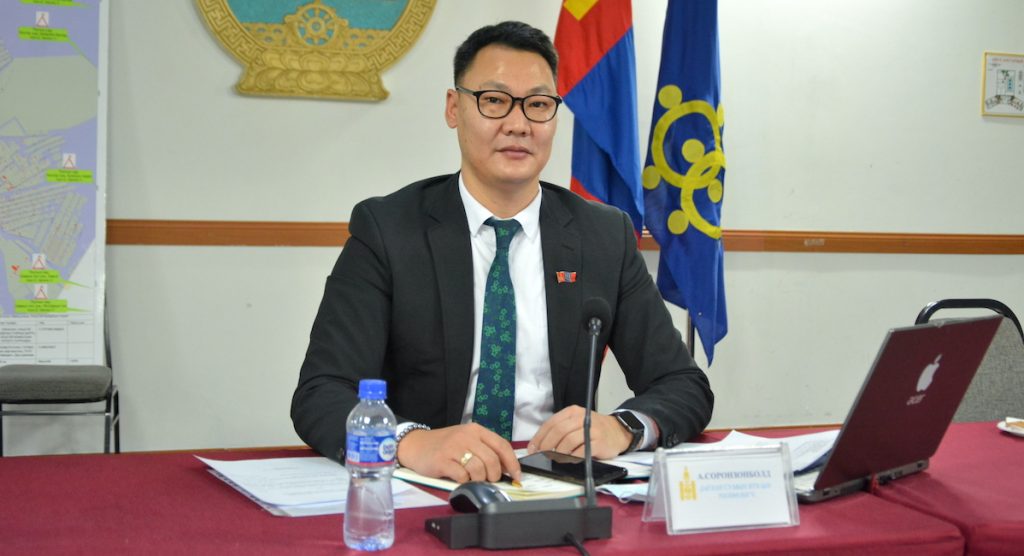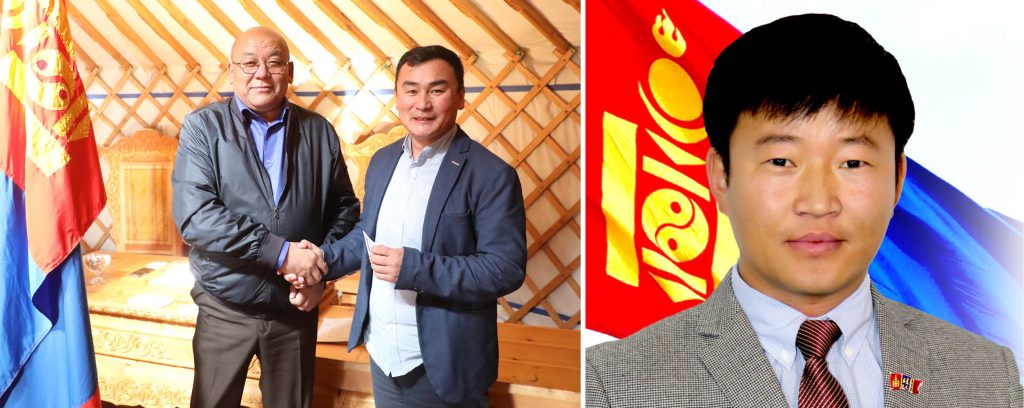-
What We Do
- WHERE WE WORK
-
About Us
 Welcome Message from Carol Jenkins
Welcome Message from Carol JenkinsFor more than 90 years, World Learning has equipped individuals and institutions to address the world’s most pressing problems. We believe that, working together with our partners, we can change this world for the better.
On my travels, I’ve had the opportunity to meet with many of those who have joined us in this mission. In Baghdad, we’ve trained more than 2,300 Iraqi youth who are already giving back at home. In London, our partners in the TAAP Initiative strongly believe that we are all responsible to practice inclusion. And in Vermont, our Experiment in International Living and School for International Training participants prove every day that they have the tools and the determination to change the world.
Please join us in our pursuit of a more peaceful and just world.
- Get Involved
Media Center > Story
What 100 Days in Office Taught Eight LEAD Mongolia Alumni
April 28, 2021

By Meghan Burland, Chief of Party, Leaders Advancing Democracy (LEAD) Mongolia
In many places, local elected officials are often the people taking care of a citizen’s daily needs — from determining local community development projects to maintaining roads and infrastructure. Additionally, national-level politicians usually get their start at the state or local levels, learning the ropes of government and how to ensure their policy goals and ideas are prioritized. Although local elections often do not receive the same level of attention as national elections, they are equally as important in determining the trajectory of a city, district, or state.
On October 15, 2020, Mongolia held its most recent election for representatives of local councils across the country. These local councils, known as Citizens’ Representatives Khurals (CRKs), are responsible for making and enacting local policies. More than 17,000 candidates from nine political parties and coalitions competed for 8,169 seats in the capital of Ulaanbaatar, nine districts within the capital, 21 aimags (provinces), and 330 soums (sub-provinces).
Eighteen alumni from World Learning’s Leaders Advancing Democracy (LEAD) Mongolia program ran in the election, with eight winning seats in either their provincial, sub-provincial, or district council. Below, all eight reflect on their experience running for office and the first 100 days of their term in office.
Several of the alumni noted that expanding youth engagement played an important role in their decision to run for office. Soronzonbold Alexandr, a 2019 In-Country Program Fellow, was elected to the CRK for the 17th district in Darkhan soum. His motivation for entering politics was to increase youth participation and to improve the living and working conditions of young people in his community. Munkhbat Nergui, a 2017 In-Country Program Fellow and CRK member from Sukhbaatar soum in Selenge aimag, expressed a similar motivation — to increase youth political participation in order to build a “just, open, democratic, and inclusive society.”
Erdenetugs Oroolon, another 2019 In-Country Program Fellow, also highlighted that his experience as an educator further motivated him to run and be a voice for young people at decision-making levels.
“The driving force of society is the youth,” Erdenetugs says. “It is clear that we have to participate today to build the society we will live in the future.”

Youth participation across Mongolia is often low. Ganbayar Monkhor, a 2019 alumnus in a CRK in Sukhbaatar aimag, believes this is likely due to a lack of employment opportunities. One of his goals is to increase employment opportunities for young people in rural areas, to empower them and support them in being productive and active members of their communities.
“We also need to seed a dream for youth that together we can create a brighter future,” Ganbayar says.
Another challenge is the need to increase innovative, new methods for resolving community issues instead of solely relying on traditional ones, says Tudevvaanchig Battulga, a 2019 U.S. Exchange Program Fellow from Zavkhan aimag. As a member of his local CRK, Tudevvaanchig wants to introduce new ideas and solutions to his community, such as training local households on waste management to improve environmental protection in public spaces and ger areas.
According to 2020 In-Country Program Fellow Jigmeddorj Batbayar, a CRK representative in Tuv aimag, young people are needed in government because they often develop daring and innovative ideas.
“Democracy is all about civic participation,” he says, adding, “I think that Mongolian youth should be more active and present as creative members of society.”
In regard to why youth often have low voter turnout, Jigmeddorj surmises it is due to a lack of civic education as well as a negative perception of being active in the community. He says, “We need to equip our young generation with knowledge about society and civic participation in various forms, such as programs like LEAD Mongolia.”
In addition, Batzaya Erdenebat, a 2017 alumnus, says corruption can also play a role in keeping young people out of government. He decided to run for office in Bayankhongor aimag because he believes that problems such as bribery and nepotism are worsening and even beginning to be accepted in society. One of his goals is to improve the integrity of the electoral process by eliminating unethical practices such as promising jobs and distributing gifts and cash. Batzaya says these practices make it harder for young people to get elected despite their knowledge and achievements.

Relatedly, he stresses that public trust in the government is declining, which he calls the “biggest challenge to democracy.” To counter this, Batzaya says elected representatives need to act transparently, solicit feedback and suggestions from constituents, and be accountable.
2019 alumnus Yadamjav Delegpuntsag was running for a CRK position for the third time, having been elected to the Chingeltei district CRK in Ulaanbaatar in 2012 and 2016, so he was already familiar with his constituents and they with him and his work. Even so, he worked hard to meet as many voters as possible to present his results from his first two terms and share his goals for his third term. He emphasized the importance of working closely with constituents to drive forward policies and projects, and highlighted his success on road, infrastructure, and construction projects in his district during his third campaign. As an elected official, he acknowledged the importance of his constituents putting faith in him to improve their district, and how it is critical to take responsibility and put that trust to good use.
“A lot of people have trusted me with the task of doing a better job, so I thought I shall try harder to bear the trust of these people,” he says.
Of course, these 100 days have been made even more complex by the COVID-19 pandemic. Several alumni noted the challenge of governing during a pandemic, from having online meetings to not being able to go out and meet directly with constituents. Additionally, members of local government are often involved in efforts to combat the virus. Munkhbat notes the hard work that went into the testing and quarantine process for citizens in Selenge, and how it took the efforts of many people working together to successfully contain the spread of COVID-19 in their aimag.
Many are also working to support constituents who are struggling because of the economic impacts of the pandemic. According to Jigmeddorj, “…the number of people facing financial vulnerability [due to COVID-19] is increasing day by day…we have provided assistance to about 200 families in need of food in our ward.”

LEAD’s focus on civic action planning provides participants with the tools and training to advance both advocacy campaigns and community-driven projects, as well as how to work with diverse groups and ensure inclusive processes for change. The LEAD experience helped motivate alumni in their choice to run, and in bolstering their confidence to be transparent, hard-working, and driven elected officials.
Munkhbat explains that the LEAD program influenced his decision to run for office and still plays a role in how he approaches his work.
“I am incorporating what I learned from the program training, meetings, and other participants into everything we do now, and focus on how to bring positive change in my community,” Munkhbat says.
According to Ganbayar, his experience with LEAD helped him “improve in many ways.” He became more confident and was able look at issues from different perspectives.
Similarly, Soronzonbold says taking part in LEAD helped him build key skills needed to succeed as an elected official.
“I learned how to communicate effectively with people, how to solve problems [by] identifying root causes, and how to achieve good results with participatory projects,” he says, adding, “I am trying to apply what I have learned to my work and everyday life, to set an example for others, and to spread the values of democracy.”
LEAD Mongolia is a five-year leadership development program — funded by the U.S. Agency for International Development (USAID) and implemented by World Learning — that brings together young professionals representing different sectors and experiences to take part in civic advocacy and leadership training, exchanges, and community action planning, all aimed at fostering a strong network of young democracy advocates across the country.
This article was made possible through the translation assistance of World Learning Program Officer Munkhkhishig Dashtseren.
The contents of this article are the responsibility of World Learning and do not necessarily reflect the views of USAID or the United States Government.





